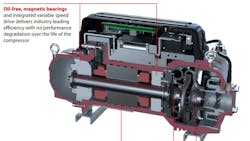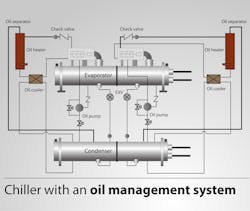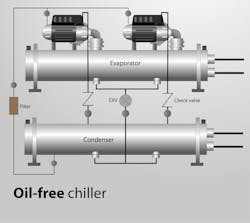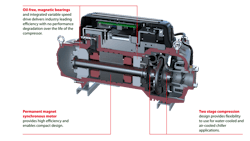The Case for Oil-Free Compressors in Institutional Buildings
By EDDIE RODRIGUEZ, strategic marketing manager, Danfoss Turbocor
One of the key challenges for institutional buildings (schools, universities, hospitals, etc.) is getting the best possible performance from the HVAC chiller while keeping maintenance costs to a minimum. Institutional buildings need their HVAC chiller systems operating at peak performance due to the high number of operating hours, but also need to keep maintenance costs low because of limited maintenance staff and budget.
Oil-free compressors can be the right choice to meet these needs by offering unique capabilities in terms of performance while also reducing maintenance costs when compared to traditional compressors using an oil management system.
Traditional compressors such as screw type require oil for several reasons,including lubrication of the compressor bearings to support the movement of the rotor and to form a seal to prevent refrigerant from traveling in the opposite direction.
Oil-free compressors using magnetic bearing, on the other hand, create a magnetic field that allows the motor shaft to levitate and avoid metal to metal contact. This eliminates the need for oil as a lubricant and thus the entire oil management system on the chiller consisting of oil pumps, heaters, sumps and separators along with the cost of installing these components are eliminated.
The result is a chiller system providing optimum performance and a simple design requiring less maintenance compared to traditional oiled systems.
Oil-free compressor technology provides superior performance simply because oil is removed from the chiller system. Over time, oil deposits into the chiller’s heat exchangers create an insulating barrier on the heat exchanger tubes which causes significant degradation of chiller efficiency and capacity.
Numerous independent third party studies have concluded that the majority of traditional oiled chillers installed in the field are overcharged with oil, resulting in degraded performance compared to their original ratings. ASHRAE Research Project 601-TRP concluded that chillers were overcharged with some samples having as much as 20% oil content in the refrigerant based on a random sampling of chillers in the field.
The impact on performance due to excess oil is significant. Even a minor amount of excess oil in the 1-2% range can result in a performance loss of up to 4% while degradation of up to 15% can occur when the oil charge is in excess of 8% of nominal levels.
The performance advantages achieved through the elimination of oil from the chiller system can also be maintained throughout the life of the compressor. Since there is no oil to inhibit performance and no mechanical wear of the internal components, this results in compressor performance that remains unchanged during the entire operating life span.
In 2018, a performance validation research project was conducted in a Tallahassee-based laboratory to compare the present-day performance of an oil-free magnetic bearing compressor with their performance when shipped “new” from the manufacturer’s factory. Three compressors in operation for more than 10 years were sent to the Tallahassee lab and the test results showed no significant change in efficiency or capacity over time.
The results of the analysis clearly demonstrate that oil-free compressors maintain consistent performance and provide customers long-term energy savings that can be realized over the life of the compressor – especially when compared to traditional oiled compressors which can incur up to a 15% reduction in performance depending on the amount of excess oil in the system.
Reducing sound levels
Additionally, traditional compressors such as screws incur mechanical wear through metal to metal contact that not only affects performance but also increases the noise levels up to 8 dbA compared to a similar size oil-free compressor. By eliminating the metal to metal contact, oil-free compressors are able reduce sound levels and minimize customer complaints.
An example of how lower sound levels can minimize customer complaints was demonstrated when an aging chiller at a Canadian public sector facility was replaced. The aging chiller was operating above 90 dB which made communication around the system extremely difficult. A 250 TR water-cooled chiller with oil-free magnetic bearing compressors was used to replace the older chiller which lowered sound levels such that communication around the new chiller while in operation was possible.
During the initial implementation, oil-free compressors had an operating range that limited it to air or water-cooled chiller applications. Recent advancements in technology have extended the operating map to allow for use in higher lift applications where traditional oiled compressors have been applied. With these changes, the benefits of oil-free, magnetic bearing technology can be utilized in higher lift applications such as air-cooled chillers in hot ambient climates, heat pumps, heat recovery, low temperature process and thermal storage systems.
Simplifying Maintenance
While long-term performance and application flexibility are obvious benefits, there is an another less obvious one with oil-free compressor technology in terms of maintenance. Removing oil from the chiller system results in a more simplified chiller design that eliminates frequent maintenance tasks required on traditional oiled chiller systems such as analyzing the oil for contaminants and changing the oil and filters.
A chiller with an oil management system adds significant components and design complexity to the system. A typical oil management system includes components such as an oil separator (separates oil from refrigerant), oil cooler (reduces temp because hot oil loses some of its lubrication properties), oil heater (boils off refrigerant to prevent dilution) and an oil pump (circulates the oil through the system). When factoring in the costs associated with maintaining and inspecting an oil management system, this can add up to $3,650 in annual maintenance, or $83,950 over the life of the chiller.
A chiller using oil-free compressor technology has significantly fewer mechanical parts and design complexity since all the components associated with the oil management system are eliminated. This results in reduced maintenance and higher reliability over the life of the of the chiller. So they do not require major maintenance events typically needed for oil-based systems in year 10, which often requires a complete overhaul of the oil-based compressors. Such costly maintenance can sometimes come as a surprise for building owners and managers, and significantly hit maintenance budgets.
This technology can be an effective solution to meet the needs of institutional buildings when selecting an HVAC chiller system. Oil-free compressors provide clear benefits in both performance and maintenance through the removal of the complex oil management system. This includes zero performance degradation through the entire operational life of the compressor, flexible map to support a wide range of application conditions, low sound levels that minimizes noise complaints, and low maintenance costs with up to $83,950 in lifetime maintenance cost savings.
When you combine those factors, it is clear that oil-free chillers provide the lowest total cost of ownership of any technology today.
##########
A mechanical engineering graduate of Missouri University of Science & Technology (MS&T), the author is strategic marketing manager for Danfoss Turbocor, where he is responsible for commercialization strategy and sales tools support. Rodriguez has 27 years of experience in HVAC working with several OEM’s in areas of applications support and product management. For more, go to www.Danfoss.com.






